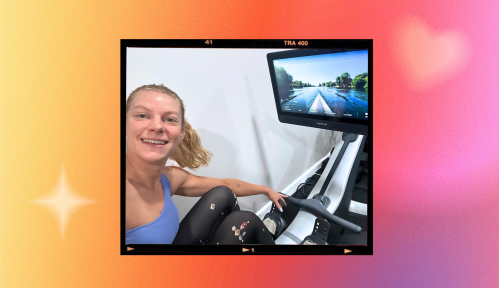Our editors independently select these products. Making a purchase through our links may earn Well+Good a commission
Almost a year into the pandemic, it seems like the right time to commit to getting stress levels under control. (If not now, right?) And because we are a culture that’s obsessed with personal data (consciously aware of our step-count, calories consumed, and hours slept), it’s not exactly surprising that the latest wearables on the market are tracking stress. While different tech companies are doing this in different ways, one up-and-coming method is tracking stress through sweat—which is how the Fitbit Sense ($279) does it.
Experts in This Article
Belen Lafon, Ph.D. is a research algorithms scientist at Fitbit and based in San Francisco, California.
Mihai Adrian Ionescu, Ph.D. is a nanotechnology researcher, head of Nanolab, and a professor at the Swiss Federal Institute of Technology.
While buzzy and cool, many people want to know exactly how this type of new technology works before shelling out $300—especially considering if you’re stressed to the point where your shirt is soaked, you don’t exactly need a wearable to tell you that you need to calm down. While stress from sweat is a new concept to most, it’s something nanotechnology researcher Mihai Adrian Ionescu, PhD, Nanolab head and Swiss Federal Institute of Technology professor, has been studying for a while—and just published a paper explaining the connection in the journal Nature. Here he, along with Fitbit research algorithms scientist Belen Lafon, PhD, give more information.
How sweat-from-stress tracking works
Dr. Ionescu explains that stress—both physical and mental—kicks off a response throughout the body, prepping it to face the stressor. One of those responses is sweating. But when we sweat, it isn’t just water seeping from our pores. Cortisol—aka the stress hormone—is excreted too. Cortisol, he says, can be detected in our blood, sweat, saliva, and urine. (Aren’t you glad the latest wearables aren’t monitoring your pee?)
In Dr. Ionescu’s experiments, his team created a chip that detects changes in cortisol through sweat. “This process is very sensitive and effective to quantify very small concentration changes,” Dr. Ionescu says. In other words: The chip detects very minimal changes in cortisol levels; you don’t have to be sweating profusely for it to detect you’re experiencing stress.
Here’s something else to keep in mind about cortisol: Cortisol levels naturally fluctuate over the course of 24 hours. (Generally, they’re higher in the morning when you wake up and lower at the end of the day.) Dr. Ionescu says his team’s technology takes this into account, as well as if someone is secreting cortisol because of physical activity. “Abnormal cortisol levels can be indeed generated by stress but also by intense physical activity,” he says. “There is a circadian rhythm of cortisol but we know quite well the ‘normal’ limits… Moreover, the technology will enable quantitative measurements over few days, so the repetition of abnormalities monitoring could confirm that it is due to stress.”
For example: If you meet with your boss every day at 2 p.m., the technology may pick up a change in cortisol levels during this time. Since this isn’t a time of the day when cortisol levels typically rise in humans and you aren’t working out, the logical conclusion is that the cortisol changes are from mental stress.
Dr. Lafon says Fitbit’s technology takes a different approach. “We approach managing stress holistically, which is why we don’t simply track the rise and fall of individual hormones or bioindicators, like cortisol,” she says. Instead, she says the Fitbit Sense is the first smartwatch with a sensor that detects electrodermal activity (the variation of the electrical conductance of the skin in response to sweat secretion).
“Because sweat is good at conducting electricity, the more sweat you have, the easier the electrical current will flow from one of the Sense electrodes to the other, allowing us to measure your skin conductance, also known as your EDA response,” she says. “Sweat can be generated by different mechanisms, one of them is through small sweat waves—so small that they are not usually perceived by us as being ‘sweaty.’ These waves can be measured by Sense, and each of them is what we call an EDA response. Measuring these responses may help users understand their body’s response to stressors and can help them manage their stress.”
The smartwatch also uses heartrate and sleep activity in conjunction with this to give an overall stress “score.” “Sense users with Premium are able to see minute-by-minute skin temperature variation while sleeping to see how your skin temperature changes throughout the night,” Dr. Lafon explains.
Dr. Lafon emphasizes that electrodermal activity is the main stress-monitoring factor for the device, with heart-rate and sleep patterns also playing a role. This, she believes, gives a more complete picture of someone’s stress versus just cortisol changes alone.
You have the data, now what?
Your wearable telling you that you’re stressed isn’t exactly a solution: It’s also important to know what to do with the information. “Stress is a nearly universal experience, with more than one-third of people across the globe reporting physical and mental side effects of stress,” says Dr. Lafon. “Especially during COVID-19, understanding and managing your body’s response to stress is more important than ever to prevent long-term impacts on your health and wellness,” she adds, emphasizing that she believes understanding the body’s response to stress is key to managing it. If a Fitbit Sense wearer gets a subpar stress score, she says the Fitbit app will offer actionable recommendations of how to get the score to a better place, such as mindfulness and meditation recommendations. (Fitbit Premium offers mindfulness sessions with Headspace.)
While Dr. Ionescu’s chip is not on the market yet as a product, he’s personally excited about the potential of the technology for improving health. “[This type of technology] opens the unexplored ‘3 Ps’ of health care: preventative, personalized, and participatory,” he says. “This will help providers be able to deliver the best therapy at the right moment and enable preventive approaches,” Dr. Ionescu says. For example, a wearable may detect that someone is stressed before they realize it themselves. Then, this information can be used to nip it in the bud before it gets worse. Armed with the info, someone will know they need to really focus on managing their stress in whatever ways work for them, whether it’s through exercise, meditation, or therapy.
This evolving technology is yet another example of how wearables are learning more about us than we know about ourselves. Have no idea how far you walked while taking the dog out? Check your stats. Wondering if you really got eight hours of sleep last night? Tech keeps the score. And now you can use it to gauge when you need to chill out. The only remaining question: What will it tell us next?
Oh hi! You look like someone who loves free workouts, discounts for cult-fave wellness brands, and exclusive Well+Good content. Sign up for Well+, our online community of wellness insiders, and unlock your rewards instantly.
Sign Up for Our Daily Newsletter
Get all the latest in wellness, trends, food, fitness, beauty, and more delivered right to your inbox.
Got it, you've been added to our email list.











